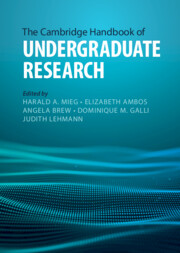32 results
Part III - Disciplines
-
- Book:
- The Cambridge Handbook of Undergraduate Research
- Published online:
- 11 August 2022
- Print publication:
- 07 July 2022, pp 183-438
-
- Chapter
- Export citation
Contributors
-
- Book:
- The Cambridge Handbook of Undergraduate Research
- Published online:
- 11 August 2022
- Print publication:
- 07 July 2022, pp xiii-xvii
-
- Chapter
- Export citation

The Cambridge Handbook of Undergraduate Research
-
- Published online:
- 11 August 2022
- Print publication:
- 07 July 2022
Part III.5 - Arts & Design
- from Part III - Disciplines
-
- Book:
- The Cambridge Handbook of Undergraduate Research
- Published online:
- 11 August 2022
- Print publication:
- 07 July 2022, pp 345-378
-
- Chapter
- Export citation
Contents
-
- Book:
- The Cambridge Handbook of Undergraduate Research
- Published online:
- 11 August 2022
- Print publication:
- 07 July 2022, pp v-x
-
- Chapter
- Export citation
Index
-
- Book:
- The Cambridge Handbook of Undergraduate Research
- Published online:
- 11 August 2022
- Print publication:
- 07 July 2022, pp 723-729
-
- Chapter
- Export citation
Part III.4 - Humanities
- from Part III - Disciplines
-
- Book:
- The Cambridge Handbook of Undergraduate Research
- Published online:
- 11 August 2022
- Print publication:
- 07 July 2022, pp 311-344
-
- Chapter
- Export citation
Part IV.4 - Europe
- from Part IV - International Perspective
-
- Book:
- The Cambridge Handbook of Undergraduate Research
- Published online:
- 11 August 2022
- Print publication:
- 07 July 2022, pp 581-582
-
- Chapter
- Export citation
64 - Undergraduate Research in Austria
- from Part IV.4 - Europe
-
-
- Book:
- The Cambridge Handbook of Undergraduate Research
- Published online:
- 11 August 2022
- Print publication:
- 07 July 2022, pp 583-590
-
- Chapter
- Export citation
Copyright page
-
- Book:
- The Cambridge Handbook of Undergraduate Research
- Published online:
- 11 August 2022
- Print publication:
- 07 July 2022, pp iv-iv
-
- Chapter
- Export citation
73 - Synopsis and Introduction
- from Part V - Avenues for Developing Undergraduate Research
-
-
- Book:
- The Cambridge Handbook of Undergraduate Research
- Published online:
- 11 August 2022
- Print publication:
- 07 July 2022, pp 661-669
-
- Chapter
- Export citation
Part IV.2 - Africa & Middle East
- from Part IV - International Perspective
-
- Book:
- The Cambridge Handbook of Undergraduate Research
- Published online:
- 11 August 2022
- Print publication:
- 07 July 2022, pp 497-532
-
- Chapter
- Export citation
1 - Introduction
-
-
- Book:
- The Cambridge Handbook of Undergraduate Research
- Published online:
- 11 August 2022
- Print publication:
- 07 July 2022, pp 1-20
-
- Chapter
- Export citation
Tables
-
- Book:
- The Cambridge Handbook of Undergraduate Research
- Published online:
- 11 August 2022
- Print publication:
- 07 July 2022, pp xii-xii
-
- Chapter
- Export citation
Part III.2 - Health
- from Part III - Disciplines
-
- Book:
- The Cambridge Handbook of Undergraduate Research
- Published online:
- 11 August 2022
- Print publication:
- 07 July 2022, pp 239-274
-
- Chapter
- Export citation
Part IV - International Perspective
-
- Book:
- The Cambridge Handbook of Undergraduate Research
- Published online:
- 11 August 2022
- Print publication:
- 07 July 2022, pp 439-658
-
- Chapter
- Export citation
Part II.1 - Implementation Models in Undergraduate Research
- from Part II - Implementation, Approaches, Methods
-
- Book:
- The Cambridge Handbook of Undergraduate Research
- Published online:
- 11 August 2022
- Print publication:
- 07 July 2022, pp 91-130
-
- Chapter
- Export citation
Part I - Theory and Research on Undergraduate Research
-
- Book:
- The Cambridge Handbook of Undergraduate Research
- Published online:
- 11 August 2022
- Print publication:
- 07 July 2022, pp 21-84
-
- Chapter
- Export citation
Part II - Implementation, Approaches, Methods
-
- Book:
- The Cambridge Handbook of Undergraduate Research
- Published online:
- 11 August 2022
- Print publication:
- 07 July 2022, pp 85-182
-
- Chapter
- Export citation
2 - Theory and Research on Undergraduate Research
- from Part I - Theory and Research on Undergraduate Research
-
-
- Book:
- The Cambridge Handbook of Undergraduate Research
- Published online:
- 11 August 2022
- Print publication:
- 07 July 2022, pp 23-32
-
- Chapter
- Export citation



